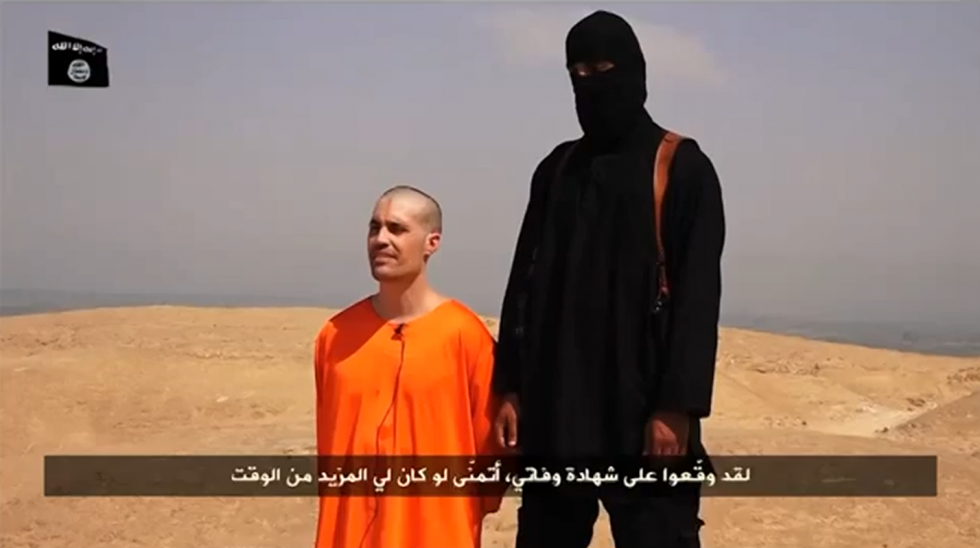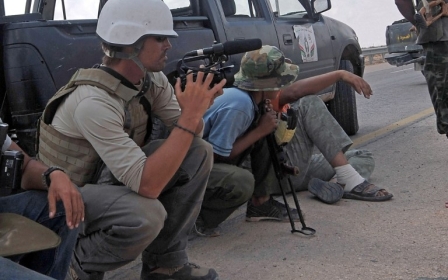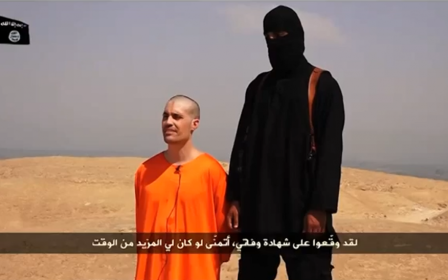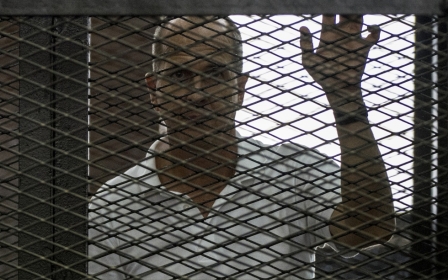UK police threaten terror charges for viewing Foley video

The Metropolitan police have gone so far as to say “viewing, downloading or disseminating extremist material within the UK may constitute an offence under Terrorism legislation”.
Authorities at Scotland Yard are currently investigating the video and are trying to identify the IS man in the video who spoke with a British accent.
Following the backlash, YouTube has promised to remove any footage of the murder from their website.
A spokesperson for the video sharing website said: “YouTube has clear policies that prohibit content like gratuitous violence, hate speech and incitement to commit violent acts, and we remove videos violating these policies when flagged by our users.
“We also terminate any account registered by a member of a designated foreign terrorist organisation and used in an official capacity to further its interests.”
The Twitter hashtag #ISISmediablackout has also urged people to share photos and videos showing James Foley as he should be remembered, smiling and doing the job he loved and not in the way IS want him to be remembered.
The man in the video says the US airstrikes in Iraq are the reason they killed Foley and they threaten to kill other foreign hostages if the airstrikes continues.
Beheading video puts spotlight on British jihadists
The distinct English accent of the militant seen beheading Foley has forced Britain once again to confront the question of how it became an exporter of jihadist fighters.
The video, published on Tuesday, has also left Britain nervously wondering how many potential jihadists are walking its streets and whether the return of fighters from Iraq and Syria will bring the violence home.
Experts say young British men are often driven into the arms of jihadist groups such as IS by adolescent feelings of alienation, often resulting from their backgrounds as second or third generation of immigrant families, as well as poor economic prospects which they contrast with the perceived glory of bloody martyrdom.
"As a generation this is a group that is not going to be as successful as their parents," Erin Marie Saltman, a senior researcher at counter-extremism think tank Quilliam, told AFP.
"It's a group that has a hard time, especially in a globalising world where identities are meant to be increasingly fluid.
"Some people prefer structure and... are vulnerable to groups that promise martyrdom, where you're an epic figure and part of 'saving the world'."
Richard Barrett, ex-head of counter-terrorism at the MI6 overseas security agency, told the BBC in June that the number who had gone to fight in Syria and Iraq "could be as high as 500 by now".
His comments came after several young British men featured in a YouTube recruitment video for IS.
"The trouble is, you don't know which ones are coming back just wanting to get on with their lives and which ones are coming back quite severely radicalised," he said.
'Mythical martyrdom'
Afzal Ashraf, an expert on terrorist ideology at the Royal United Services Institute (RUSI), said that within the ranks were "a very significant number of gangsters and criminals, who've been radicalised and converted in prison".
But he added that genuine anger over world events involving the Muslim community was also a vital motivating factor.
"In the Spanish civil war, we had poets like Laurie Lee, Ernest Hemingway and others who felt, as young men, very strongly that there was some oppression going on," he said.
"It's the same sort of basic feeling, that Muslims are being oppressed by Western governments, or their clients' governments in the Middle East."
He played down suggestions that these fighters posed a threat at home, saying most had bought into the "mythical martyrdom narrative" and had no desire to return.
The fact that Foley's killer may have been British is not a sign that Britons are more barbaric than others, said Saltman. Rather, they are used for propaganda purposes.
"It was very much a deliberate decision to have an American victim and a British foreign fighter," she said.
"When we are seeing an individual who has obviously been brought up in what we consider a civil democratic society, that hits us a lot more."
In reality, British fighters are often given second-tier roles such as suicide bombers or guards due to a lack of trust and their inability to speak Arabic, said Ashraf.
'Real losers'
The apparent normality of would-be jihadists was highlighted earlier this month when 25-year-old Muhammad Hamidur Rahman, a former worker at low-budget clothing chain Primark, became the latest Briton to be killed fighting for IS.
Young, tech-savvy British fighters have been documenting their exploits on social media, such as 19-year-old Madhi Hassan, who sent out an image of himself holding a jar of Nutella hazelnut chocolate spread to convince would-be colleagues that they would not miss home comforts.
Abdel-Majed Abdel Bary from west London recently posted a picture on Twitter of himself holding a severed head, and added the caption "chillin' with my homie, or what's left of him".
In total, 69 people suspected of Syria-related jihadist activities have now been arrested in Britain.
Despite their use of social media, the seeds of radicalism are usually sown offline and recent IS gains could make recruitment easier, said Saltman.
"A month ago, I would have told you that fighters coming from Britain was tailing off, but people are more likely to join a winning cause. The IS is now seen as a winning cause."
Ashraf disagreed, saying that the group's appeal would be fleeting.
"They've caused misery in the Muslim world and they are, in the real sense of the word, a bunch of losers," he said.
New MEE newsletter: Jerusalem Dispatch
Sign up to get the latest insights and analysis on Israel-Palestine, alongside Turkey Unpacked and other MEE newsletters
Middle East Eye delivers independent and unrivalled coverage and analysis of the Middle East, North Africa and beyond. To learn more about republishing this content and the associated fees, please fill out this form. More about MEE can be found here.




